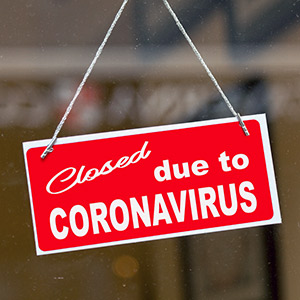
Steven Merdinger, an accountant with many clients in the jewelry industry, has told them they should file business interruption claims with their insurance company—even though they will almost certainly be rejected.
“They’ll probably send it back with a reservation of rights,” says Merdinger, managing partner of New York City–based KMR.
All of which makes filing a claim seem pretty futile and a waste of time—except that enough is happening that it’s possible things could change.
Insurance groups have clearly stated that COVID-19 closures are not covered by business interruption policies. Following the SARS epidemic in 2006, many insurers added provisions—little-noticed at the time—specifically excluding losses “due to virus and bacteria.”
New York State’s department of financial services page notes that, while policies vary, “business interruption coverage typically can only be triggered if you have property loss that leads to the business interruption. One example could be that a fire in your office has caused you to suspend your business activities.”
Jamie Luce, executive vice president of Jewelers Mutual Insurance Co., says that it’s “clear” that COVID-19-related losses are not covered by current business interruption policies, just like they don’t cover nuclear war or other events that affect everyone in the world.
“Insurance companies don’t have near enough capacity to be able to do that,” Luce says. “It would mean subsidizing the entire gross domestic product of this country. It would bankrupt the entire property-casualty insurance company industry.”
Luce says Jewelers Mutual is supporting policyholders in other ways. It’s waiving late fees and will not be canceling policies for nonpayment for the next 60 days. It’s also developed a “hassle free” program with Malca-Amit that gives jewelers whose stores are closed the option of storing their goods in a secure facility.
He adds that the federal government has put in place a variety of measures—including the Small Business Administration’s Emergency Injury Disaster Loans and the Paycheck Protection Program—to provide small businesses with needed liquidity.
However, some legislators believe insurers should bear at least part of the burden here.
Bills have been introduced in Massachusetts, New York, New Jersey, and Ohio that would require insurers to cover business interruptions caused by COVID-19.
These bills “have been met with swift backlash from the insurance industry,” Alan Lyons, a partner and chair of the insurance and reinsurance group with New York City law firm Herrick, wrote in a blog post. “Insurers claim that the bills set a dangerous precedent by essentially forcing insurers to rewrite or ignore policy provisions such as a virus exclusion that had been approved by state regulators.”
He adds that “these bills, if passed, will undoubtedly face legal and constitutional challenges by the insurance industry.”
Still, they could force some concessions.
United Policyholders, an advocacy group, recently wrote that “regardless of the success of these initiatives, similar ones helped motivate insurers to voluntarily pay claims they otherwise might have rejected after past disasters, including Hurricane Katrina and Superstorm Sandy.”
A handful of policyholders is also pressing its case in court. The owner of a New Orleans restaurant has filed suit against his insurer for not covering business losses during the government-mandated closure. So has celebrity chef Thomas Keller for two of his restaurants in California.
Given all this, it’s possible that Congress might step in to referee and stop a flood of lawsuits from clogging the courts.
According to the Financial Times, a bipartisan group of Congressional representatives have asked insurers to recognize COVID-19 financial losses for small businesses—and have suggested, if that happens, they will try and add some form of insurer support to the next stimulus bill.
Which brings us back to why Merdinger recommends his clients file for business interruption insurance, despite the long odds of receiving it. If something does change, they will be first in line to receive it.
(Photo: Getty Images)
- Subscribe to the JCK News Daily
- Subscribe to the JCK Special Report
- Follow JCK on Instagram: @jckmagazine
- Follow JCK on X: @jckmagazine
- Follow JCK on Facebook: @jckmagazine